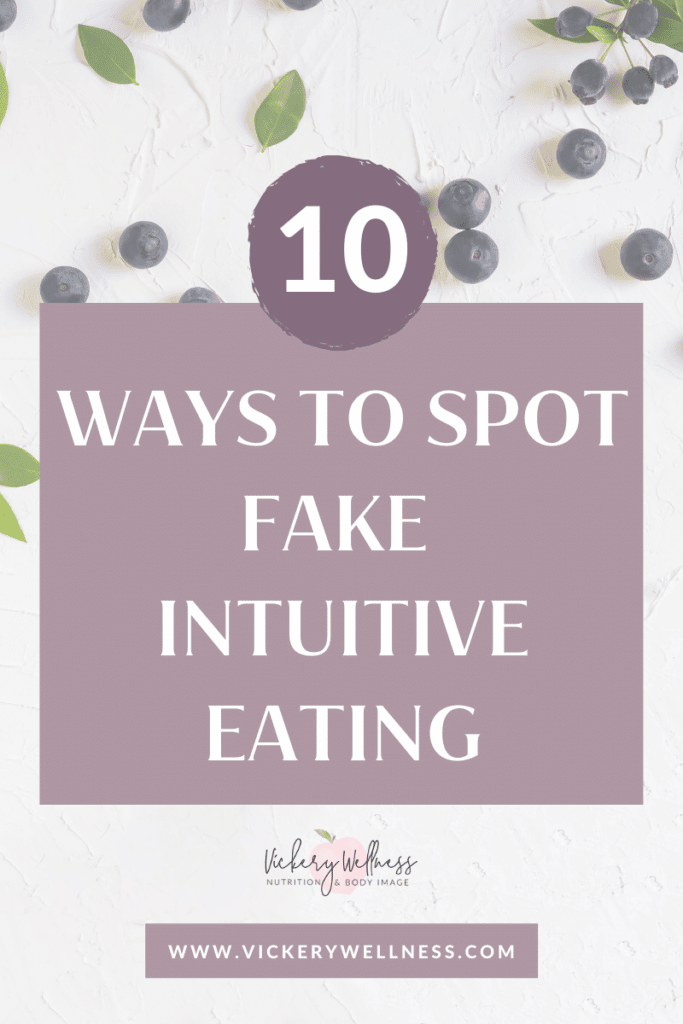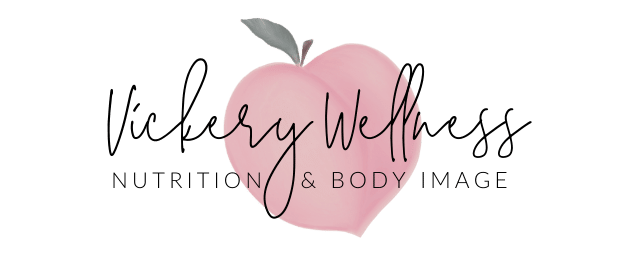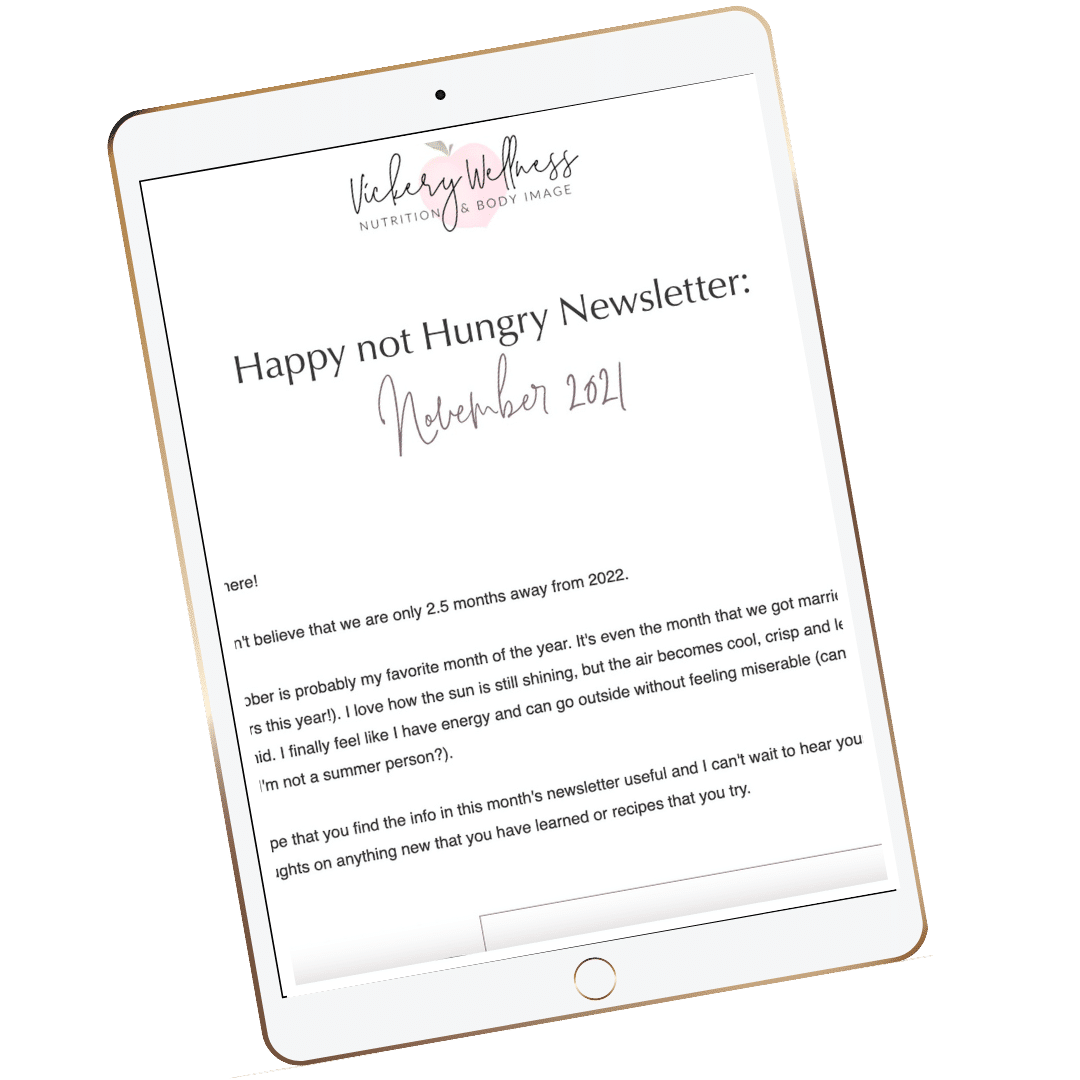It’s hard to know who to trust when it comes to healthy eating advice. One day, you’re told to cut out carbs, and the next day you’re supposed to load up on them. It seems like everyone has a different opinion on what’s best for your body. So how can you know if you’re following a way to eat that is best for you or just someone else’s version of the “perfect diet?”
One way you can focus on your overall health and wellbeing is by using the Intuitive Eating approach. Intuitive Eating focuses on listening to your body and honoring your hunger and fullness cues, rather than counting calories or following a set meal plan. But what happens when you come across someone who claims their approach is based in Intuitive Eating and they start talking about weight loss or ‘moderation?’ Or essentially, fake Intuitive Eating.
When it comes to Intuitive Eating, it’s important to be able to spot the fake “intuitive eating” versions out there. So today, I’m going to share with you some tips on how to differentiate between authentic Intuitive Eating and diets masquerading as intuitive eating.
ANY mention of intentional weight loss or ‘management’ by practicing Intuitive Eating
I cannot even tell you how many times I have looked at someone’s website or social media who claims to be Intuitive Eating based and then I see information or comments about how they can help you lose weight. Or another ‘tricky’ phrase that is common is ‘weight management.’ But, here is the deal, you cannot practice Intuitive Eating and also practice INTENTIONAL weight loss. I have recently seen some posts that feel that those in the anti-diet sphere are anti weight loss. We are not anti-weight loss. We are anti INTENTIONAL weight loss that causes a large percentage of people to become disordered in their relationship with food and their body.
I personally believe in body autonomy and would never judge ANYONE for having the desire to lose weight and acting on it. However, I am not the health professional for them if their main goal is to focus on weight loss. I always tell my clients that it is 100% normal and completely fine to have the desire to lose weight. But, they have to decide if that is what they want to focus on more as opposed to fully giving in to the Intuitive Eating process.
Any talk of counting macros, calories, carbs, etc.
If they talk about how ‘all foods can fit,’ but then say the caveat of as long as it fits in your macros, or whatever, then say peace out ✌️ This is an example of diet culture making us use external cues instead of practicing attunement with our bodies.
Once a client completes the Intuitive Eating process with me, they will have ditched diet culture. This means that now they have no interest or desire to count calories on a tracking app, use a red, green, yellow light system in order to know whether they are nourishing their body properly. They have taken the restrictive mindset off the table (pun intended), which allows them full food freedom. It definitely sounds scary in the beginning (the whole ‘I can’t have cookies in the house or I will eat them all!’ mentality is real), BUT if you follow through the hard part in the beginning and learn to fully trust your body, your body will tell you what it needs. I know what someone is thinking right now, but what if I a) have a health condition that prohibits me from being able to listen to my body or b) they have been told their health condition can only be solved with weight loss.
To address the first one, again I believe in 100% body autonomy and knowing yourself best. If you have a health issue (for example, ADHD) that makes it truly difficult for you to practice interoceptive awareness, then there are specific resources available that we can utilize to help you find a way to apply Intuitive Eating to your life. To address the second concern, I would really encourage you to do some reflection on whether it is solely the weight loss that would help your health condition OR is it the practicing of healthy behaviors that truly have the benefits (hint: it’s the latter).
Uses hunger and fullness cues as a way to control food intake.
Intuitive Eating is NOT the ‘hunger and fullness diet’ like many would like to believe. It’s SO much more than just the feelings of hunger and fullness in your body. It’s a deep, therapeutic dive into all of your thoughts and beliefs about food, your body, and more! I believe that this is likely the #1 misconception about Intuitive Eating. It can be hard to have a solid message about what exactly Intuitive Eating IS, so I think it is understandable that many people have this perception.
When people ask me what exactly Intuitive Eating is defined as, I typically use the quote straight from the creators: “Intuitive Eating is a self-care eating framework, which integrates instinct, emotion, and rational thought and was created by two dietitians, Evelyn Tribole and Elyse Resch in 1995. Intuitive Eating is a weight-inclusive, evidence-based model with a validated assessment scale and over 125 studies to date.”
Claims of using the psychology of Intuitive Eating to help you lose weight
I think we all know what program I am talking about with this example. The diet industry has caught on to the fact that people are figuring out their secret: DIETS DO NOT WORK. The diet industry is actually *depending* on this fact in order to continue fueling their $72 BILLION dollar business. So, the fact that they are co-opting the language that we use in the anti-diet sphere is not a surprise, but that doesn’t make it any less frustrating. I have had so many clients come to me with disordered eating that was set off by programs and apps that preyed on them with this type of verbiage. I think it’s best to stick with the old adage, if it sounds too good to be true, then it likely is.
Any talk of ‘cheat days’
Even before I became a full-fledged Intuitive Eating Counselor with a weight-inclusive approach, I have always hated cheat days. This is the epitome of the bing-guilt-restrict cycle. Again, if you find that it truly works for you, then that’s great. But, I find these approaches are often more harmful than helpful. It puts the ‘bad’ foods on a pedestal and makes the likelihood of eating past fullness inevitable due to the ‘last supper’ mentality. Also, if you feel the need to ‘cheat’ on your diet, then is it really what’s best for you in the long term?
Any claims that intuitive eating principles should be used as ‘rules’
Rules are the antithesis of Intuitive Eating. The entire approach is based in flexibility and attunement with your body. Many times clients will come to me and think that we have to go through the principles in order or in a ‘perfect’ way. I always tell them that there is no winning or losing with Intuitive Eating. It’s not another 12-week quick fix. It’s a whole new approach to changing your entire view of food, how it nourishes your body and how you view your body. So, don’t worry about doing Intuitive Eating wrong and if anyone tells you that you are, then they should probably be added to this list of fake intuitive eating red flags 😉

Saying that Intuitive Eating is simply mindful eating
Intuitive Eating and mindful eating get mixed up all.the.time. Most people think they are the same thing. But, I promise you that it’s not the same at all. Mindful eating has some aspects that are similar because it also focuses on paying attention to what you are eating and how full you feel. But, that’s where the similarities end! Intuitive Eating has a validated assessment scale that has been used in over 125 studies. The approach is based on the 10 principles and requires a LOT of reflection and work in order to rewrite the narratives we have written about food and our bodies for so many years.
Limiting or not allowing ANY type of food
I’m looking at you, Goop. Intuitive Eating is not compatible with any recommendation of limiting or excluding any foods (outside of your own specific personal health reasons, i.e. a food allergy) and it’s definitely not compatible with any form of fasting. So, the next time you see someone say they practice Keto with Intuitive Eating or they limit their carbs, etc. then run far, far away from these fake Intuitive Eating ideas.
Any ‘before’ and ‘after’ body photos
There’s no way around it, before and after photos imply that the before photo is the ‘bad’ or less desirable version of the photos. Otherwise, what is the point of them? So, if you see someone who is Intuitive Eating based and yet they are posting several before and after body photos of either themselves or their clients, then it’s very likely that they are also co-opting the language of Intuitive Eating in order to make a sale.
Anything that isn’t HAES aligned
The creators of this approach have made it clear that this framework is aligned with Health at Every Size. If you aren’t sure what exactly HAES is, then check out these other posts where I discuss it and also check out their website. I really like defining HAES at Health for ALL sizes. Meaning that everyone, no matter what their size, deserves to be able to have access to appropriate health care and ways to practice healthy behaviors that work for them.
Be wary of wolves in sheep’s clothing
Intuitive eating is a great way to live your best life and maintain a healthy relationship with food. But it’s important to be able to tell the difference between real intuitive eating, and fake intuitive eating so you can do what feels right for you at any given time.
In this post, I’ve provided a list of red flags to help you spot fake intuitive eating from the real thing. If someone tells you they don’t count calories or calculate macros but still practice moderation, that might be true. However, there are other ways people may try and manipulate their hunger fullness cues as an attempt to control their intake of foods.
Remember, Intuitive eating is not about intentional weight loss or controlling food intake through counting calories and macros. Instead, it’s about trusting your body when it comes to hunger fullness cues and following those signals as indicators for what is best for YOU!
Want more information? Sign up for my private nutrition counseling today!








0 Comments